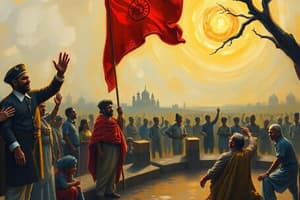Podcast
Questions and Answers
What was the main goal of the Swadeshi movement?
What was the main goal of the Swadeshi movement?
- Promote the use of foreign products over local goods
- Increase British imports to India
- Foster unity among Indians against colonialism (correct)
- Strengthen economic ties with foreign countries
Who were some of the leaders who initially supported the Swadeshi movement?
Who were some of the leaders who initially supported the Swadeshi movement?
- Rabindranath Tagore and Bankim Chandra Chattopadhyay (correct)
- Winston Churchill and Queen Victoria
- Mahatma Gandhi and Jawaharlal Nehru
- Abraham Lincoln and George Washington
What did the Swadeshi movement encourage Indians to do regarding British goods?
What did the Swadeshi movement encourage Indians to do regarding British goods?
- Increase the consumption of British goods
- Stop using Indian products
- Import more British products
- Boycott British goods and use Indian handloom textiles (correct)
What event led to the emergence of the Swadeshi Movement in India?
What event led to the emergence of the Swadeshi Movement in India?
When did the partition of Bengal take place?
When did the partition of Bengal take place?
Who played a significant role in encouraging the growth of the cottage industry in Bengal during the Swadeshi movement?
Who played a significant role in encouraging the growth of the cottage industry in Bengal during the Swadeshi movement?
What was widely adopted as a result of the Swadeshi Movement?
What was widely adopted as a result of the Swadeshi Movement?
Who argued that the partition of Bengal could create animosity between religions and ethnicities?
Who argued that the partition of Bengal could create animosity between religions and ethnicities?
What was the main goal of the Swadeshi Movement in India?
What was the main goal of the Swadeshi Movement in India?
How did the partition of Bengal influence India's nationalist sentiment?
How did the partition of Bengal influence India's nationalist sentiment?
What was the ideological foundation of the Swadeshi Movement?
What was the ideological foundation of the Swadeshi Movement?
Which region became part of British India after the partition of Bengal?
Which region became part of British India after the partition of Bengal?
Flashcards are hidden until you start studying
Study Notes
Partition of Bengal and Swadeshi Movement
The partition of Bengal in India was a significant event in its history, leading to the emergence of the Swadeshi Movement. This essay will explore these two topics in detail.
Partition of Bengal
When one thinks of India prior to independence, it is often visualized as a single entity. However, before 1905, British colonial rule had divided Indian provinces into numerous units, some of which were part of what later became Pakistan. In this framework, Bengal Province, located in Eastern India, was further divided along religious lines.
The partition of Bengal was implemented on August 16, 1905. The central province included the predominantly Muslim region of East Bengal and Assam, while West Bengal became part of British India. This division aimed to balance the numerical majority of Muslims and Hindus in both regions. However, political leaders like Rabindranath Tagore argued that such a partition would create animosity between religions and ethnicities, potentially leading to conflict. These fears soon came true when the Swadeshi Movement emerged.
Swadeshi Movement
The Swadeshi Movement was a nationalist movement advocating self-reliance and boycotting foreign goods in favor of locally produced items. Its emergence is often linked to the partition of Bengal, as it served as a catalyst for such a campaign across India. The Swadeshi ideology sought to counteract the economic impact of British rule over Indian provinces. It was intended to foster a sense of unity among Indians against colonialism, strengthen their economic self-reliance and promote the use of local products over foreign goods.
The Swadeshi movement was initially supported by various leaders like Rabindranath Tagore, Bankim Chandra Chattopadhyay, and Subhash Chandra Bose. It led to boycotts of British goods, which were replaced with Indian handloom textiles, encouraging the growth of the cottage industry in Bengal under the leadership of Shibnath Shastri. The movement's success can be seen in the widespread adoption of Khaddar (handwoven cloth).
Conclusion
In conclusion, the partition of Bengal played a crucial role in shaping India's nationalist sentiment towards independence. The emergence of the Swadeshi Movement marked an essential turning point in India's freedom struggle. By advocating for self-reliance and locally produced goods, it fostered unity among Indians against colonial rule and promoted the development of the domestic economy.
Studying That Suits You
Use AI to generate personalized quizzes and flashcards to suit your learning preferences.




